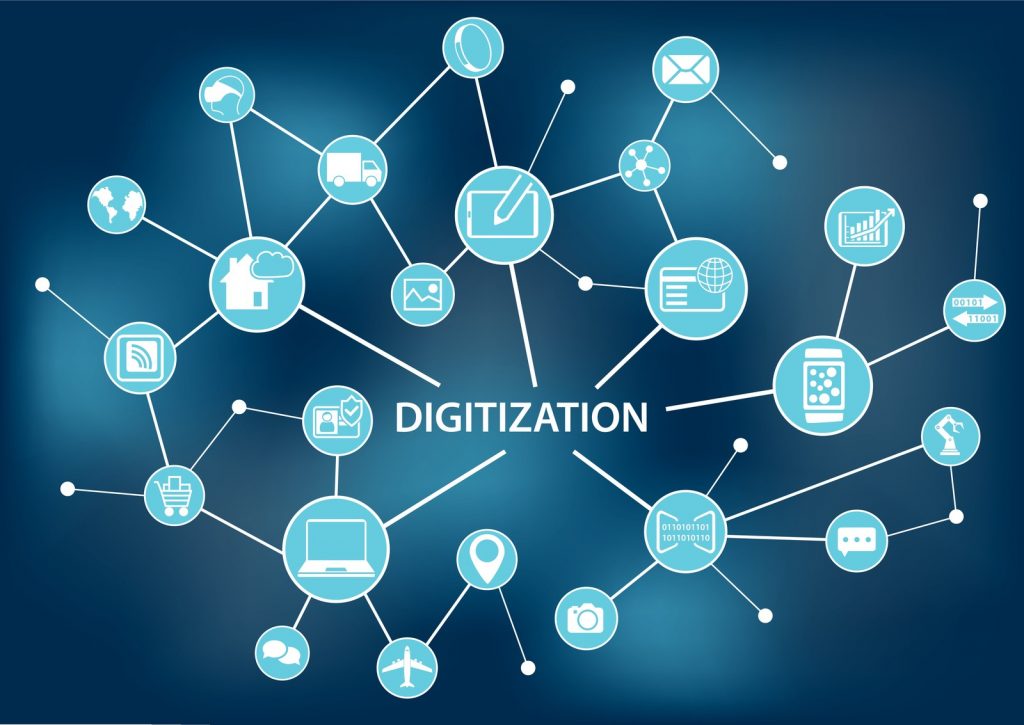Digitalization refers to converting information or physical objects into a digital form, typically using computers or other digital devices.

It involves using technology to transform manual or analog processes into digital ones, aiming to improve efficiency, accessibility, and accuracy.
In the business context, digitalization often involves using digital technologies to automate processes, enhance customer experiences, and create new business models. This can include using tools like artificial intelligence, data analytics, and cloud computing.
The power of digitalization lies in its ability to transform virtually every aspect of our lives, from how we work and communicate to how we access information and consume goods and services. By embracing digital technologies, we can improve efficiency, drive innovation, enhance customer experiences, and unlock new opportunities for growth and prosperity.
Digitalization has become increasingly important in recent years as technology has advanced and becomes more accessible. It has transformed many industries, from finance to healthcare to retail, and has enabled new forms of communication and collaboration.
Digitalization can help small businesses become more competitive and adapt to the changing needs of customers and markets. By embracing digital technologies, small businesses can increase their efficiency, reach, and profitability while improving the customer experience and staying ahead of the competition.
Here are some key benefits of digitalization for small businesses:
Digitalization can help small businesses automate processes and eliminate manual tasks, saving time and increasing productivity.
Digitalization can make it easier for small businesses to connect with customers, provide better service, and offer more personalized experiences.
Digitalization can help small businesses reach new markets and expand their customer base through e-commerce platforms, social media, or other digital channels.
By providing more cost-effective alternatives, digitalization can help small businesses save money on marketing, advertising, and office space.
Digitalization can provide small businesses access to data and analytics tools to help them make more informed decisions about their operations, finances, and marketing strategies.
Evaluating digitalization in business involves an integrated approach encompassing several factors, including ROI, impact on business processes, cybersecurity, data analysis, and customer satisfaction. By evaluating these factors, businesses can determine the effectiveness of digitalization and make informed decisions on future investments in technology. Some key considerations when assessing digitalization include:
One important factor to consider when evaluating digitalization is the return on investment (ROI). This involves looking at the costs associated with digitalization, such as the cost of implementing new technology or training employees and comparing them to the benefits, such as increased productivity, improved customer satisfaction, or higher revenues.
Another important consideration is the impact of digitalization on customers and employees. For example, does digitalization make it easier for customers to access information or products, or does it create barriers? Does it improve or diminish the experience of employees?
Digitalization can impact many aspects of a business’s operations, from supply chain management to marketing to customer service. Evaluating the impact of digitalization on these processes can help identify areas where improvements can be made.
Digitalization often involves the collection and analysis of large amounts of data. Evaluating the quality and accuracy of this data and the effectiveness of data analysis tools and techniques is an important part of assessing digitalization.
As digitalization increases, so does the risk of cyberattacks and data breaches. Evaluating the effectiveness of cybersecurity measures and data privacy policies is important when assessing digitalization.
In conclusion, digitalization has become a crucial factor in the success of businesses in today’s digital age. Embracing digital technologies can bring several benefits to businesses. With the right investments in technology, infrastructure, and staff training, companies can transform their operations and adapt to the changing needs of customers and markets. Therefore, businesses need to recognize the power of digitalization and leverage it to drive growth and competitiveness in today’s fast-paced business environment.
we are the best company giving services of UI UX designing, web developing or SEO since 2001.